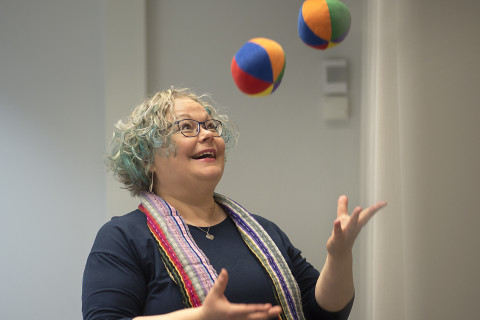“My teaching has always been blended, including elements of both on-ground (or on-site) learning and online learning. Nevertheless, having to do absolutely everything only online felt very challenging. Adding to that the aspect of self-isolation and remote work from home, things started to turn rather bleak,” says University Lecturer Susanna Kohonen, describing how she felt during the first weeks of the coronavirus-enforced lockdown.
In these exceptional circumstances, surprisingly enough, Twitter proved to be a lifesaver.
“I joined Twitter in 2016, but as the fully online teaching period started, I realised how much I could draw on the resources that Twitter makes available. Collegial support was therefore transferred into online environments, but in a most fruitful way.”
“Moreover, social media was such a great window to the outside world when isolation and loneliness started to seem overwhelming. In addition to professional support, certain Twitter communities were also channels for emotional support in the exceptional circumstances caused by lockdown.”
“My Language Centre colleagues and work community were and still are great, too, in providing online support and encouragement. For example, we set up a WhatsApp group of our own, for these purposes.”
Community building instead of toxicity
Twitter has recently received a lot of critique, and several public figures have said they decided to leave Twitter due to its continuous negativity, polarization and smearing.
“I know that many people’s image about Twitter is that it is full of toxicity. I stay out of that by choosing the accounts and hashtags I follow and reading that content only. Academic Twitter is a must nowadays, too.”
Kohonen says that after having discovered a couple of key hashtags and a couple of active colleagues on Twitter, a whole new world of supportive online communities and resources opened up, and with that, more new people to follow.
“This was so important especially in March 2020, when all of a sudden everything had to function in a fully online mode. The communities I follow are so helpful in sharing tips and ideas concerning online teaching and online learning. I warmly recommend the hashtag #digped, for example. It was launched by teachers who were professional fully online teachers for several years before the coronavirus hit us.”

Networking led to an invitation to a podcast interview
Building networks is another bonus of being active on social media. Kohonen experienced this first-hand as she was contacted by Dr Louise Drumm from the Department of Learning and Teaching Enhancement of Edinburgh Napier University, asking Kohonen to be a guest interviewee in the first episode of their new podcast, Conversations on Online Learning.
“The department in question is the unit that provides support for online teaching at their university, so I was honoured to be part of their very first podcast.”
Kohonen had tweeted snippets from her blog that Dr Drumm then read, got interested in and wanted to hear more about.
“In the podcast, we discuss what online teaching means in my own work and what my thoughts are on fully online teaching. I also share a couple of concrete examples from my own courses.”
Based on her experiences, Kohonen would like to promote an increased use of Twitter in the Finnish teaching scene, too.
“Although we consider Finland to be a model country of sorts in teaching and learning, we would have a lot to learn from our international colleagues, too.”
Kohonen says she has found wonderful online communities, blogs, courses, and websites through Twitter. Furthermore, she says she has been able to network with people she may have never met otherwise.
“I have gotten plenty of useful tips for my own online teaching through Twitter. I keep discovering more and more to learn and read, too. I truly have gained transformational insights into my own teaching through some of my Twitter contacts, and based on these insights, I have been able to further develop my own online pedagogy.”
Facilitators provide support in online teaching
Kohonen stresses that she does not speak only for fully online teaching.
“I still firmly believe in the power of face-to-face interaction that takes place on-ground, on-site. The energy is of course different than in fully online interaction. Therefore, first and foremost I am not seeking more technical tips, but I believe that the human factor and our humanity always come first. Only after that should we start thinking about what we could do online, and how.”
Kohonen will soon get to put her know-how to practice. She is one of the five Facilitators who started their work at the University of Eastern Finland earlier in January. The other Facilitators are Helena Kantanen, Kati Kasanen, Vesa Paajanen and Piia Siitonen.
“We are very excited about this! We had our first meetings already at the end of last semester, and initiated discussions regarding our job description on how to support online learning and online teaching at UEF.”
Stay tuned! More information to come regarding the UEF Facilitators.
Listen to the podcast in which Susanna Kohonen discusses online teaching with Louise Drumm
Susanna Kohonen’s blog on online teaching, in both Finnish and English
